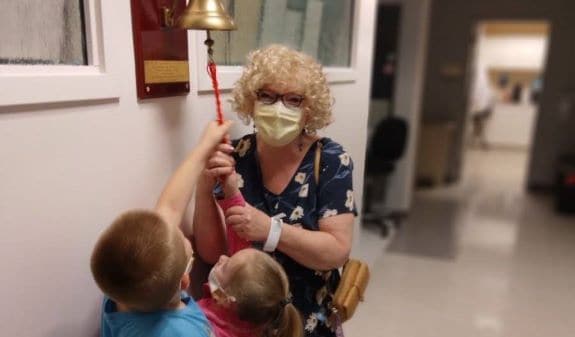If you haven’t heard of palliative care or aren’t quite sure what it is, you’re not alone. Surveys find that most people and even some doctors, don’t have a full understanding of palliative care and all it has to offer those with cancer or other major illnesses.1
What is palliative care?
Palliative care is a special type of health care for people with a serious illness. Its goal is to improve the quality of life of both patients and their families.
Palliative care encompasses a wide range of therapies and services. It can be used across the full spectrum of breast cancer care, from initial diagnosis and treatment to end-of-life care and bereavement.
Many breast cancer patients may not be aware or understand palliative care, but it should be provided throughout the spectrum of care.
Palliative care and early breast cancer
In early breast cancer, palliative care can be used to help prevent and relieve symptoms and side effects related to cancer and its treatment such as pain, nausea and fatigue. Controlling these symptoms is an important part of treatment. A person should never hesitate to tell his or her oncology team about any pain or other symptoms.
Palliative care and metastatic breast cancer
Palliative care plays a bigger role for those with metastatic breast cancer than for those with early breast cancer.
As with early breast cancer, a main focus of palliative care in metastatic breast cancer care is the management and prevention of symptoms and side effects related to the cancer and/or its treatment.
However, palliative care can also help patients and family members:
- Address spiritual and emotional issues
- Get support for making decisions about treatments and other care
- Access grief counseling
Who provides palliative care?
At many hospitals, the oncology team is able to provide most of the initial palliative care a metastatic breast cancer patient may need.
These multidisciplinary teams can include doctors, nurses, physician assistants, counselors, dieticians, social workers and chaplains. Other care providers can be brought in depending on specific needs.
What are the benefits of palliative care?
Palliative care provides many important benefits to both breast cancer patients and their families.
Randomized controlled trials have shown palliative care improves quality of life and maintains or improves survival for people with metastatic breast cancer.2-3
For example, in one study of women with metastatic breast or gynecological cancer, earlier consultation with a palliative care team lowered rates of depression and improved quality of life and survival.4
How do you get the most from palliative care?
Palliative care works best when it is integrated early in metastatic cancer care, no matter the prognosis.
Unfortunately, many doctors still equate palliative care with end-of-life care and may put off referring a metastatic breast cancer patient to palliative care until very late in her life.
To get the most from palliative care, patients and their families may need to be proactive about asking their oncology teams for help with symptom management or other issues related to palliative care, such as hospice or counseling.
Komen Scholar Dr. Julie Gralow, Director of Medical Breast Oncology at the University of Washington reinforces this message. She says, “There is a misperception among patients, the public and even health care providers that palliative care is equivalent to end-of-life care. Palliative care, at its core, is really focused on maximizing overall physical and emotional health that can benefit all patients. It’s never too early to make this an important component of care.”
What is end-of-life care?
End-of-life care is a key part of palliative care that focuses on meeting the needs of patients and their families toward the end of life.
Hospice is a specific part of end-of-life care that works to preserve quality of life and allow a person to die as comfortably and with as much dignity as possible.
Hospice care can begin when a person has a prognosis of six months or less to live. Some programs only enroll people who have stopped active cancer treatment. Others enroll people who are still on active treatment (sometimes called “open access” programs).
Hospice is usually provided at home, but can also be provided in a hospital or other health care setting.
When should end-of-life care begin?
End-of-life care may begin earlier than hospice, as people with metastatic breast cancer and their families begin to consider a time when curative treatments may be stopped.
These are not always easy discussions for patients or families, but they can be key to a higher quality of life for a patient in her final months.
As with palliative care in general, patients and families may have to be proactive about seeking appropriate end-of-life care. Studies show that doctors often refer patients with metastatic cancer to hospice very close to time of death, if at all.2 This means many patients and their families do not get its full benefits.
Research has shown starting end-of-life care earlier has a positive impact on quality of life, symptom management and satisfaction with care for both patients and family members.2
Summary
The aim of palliative care is to improve the quality of life for patients (and their families) facing a serious illness like breast cancer. It can begin as early as initial diagnosis and continue through to end-of-life care and bereavement.
A main focus of palliative care is the management and prevention of symptoms and side effects of cancer and/or its treatment. Palliative care, however, focuses on the whole person and includes a wide range of care and services for patients and their families.
For metastatic breast cancer patients, palliative care is often underused. It may be important for patients and families to be proactive in getting appropriate palliative care in the course of the cancer journey.
What is Komen doing?
Komen supports breast cancer research across the care continuum, including palliative and end-of-life care.
Since 1982, Komen has invested more than $17 million in research focused on palliative and end-of life care issues for breast cancer patients and their families. Ongoing research includes:
- Determining the causes of muscle weakness in women with bone metastases and testing whether drugs that reduce inflammation can prevent muscle pain and weakness.
- Identifying the causes of pain related to aromatase inhibitor use and identifying drugs to treat this pain.
- Identifying the causes of shoulder stiffness and pain linked to different radiation therapy techniques and how to reduce these side effects.
Komen resources
Website resources
Early Breast Cancer – Symptom Management and Supportive Care
Early Breast Cancer – Managing Pain
Metastatic Breast Cancer – Symptom Management and Supportive Care
Metastatic Breast Cancer – Managing Pain
Hospice
Fact sheet and brochures
Metastatic Breast Cancer
Questions to Ask Your Doctor About Metastatic Breast Cancer
Co-Survivors: How to Help Those You Care About Cope with Breast Cancer
End-of-Life Care
| KOMEN SUPPORT RESOURCES |
| Calls to our breast care helpline 1-877 GO KOMEN (1-877-465-6636 |
References
- Center to Advance Palliative Care. 2011 Public Opinion Research on Palliative Care. https://goo.gl/2jojcU, 2016.
- National Comprehensive Cancer Network. NCCN Guidelines: Palliative Care, Version 1.2016. http://www.nccn.org, 2016.
- Smith TJ, Temin S, Alesi ER, et al. American Society of Clinical Oncology provisional clinical opinion: the integration of palliative care into standard oncology care. J Clin Oncol. 30(8):880-887, 2012.
- Rugno FC, Paiva BS, Paiva CE. Early integration of palliative care facilitates the discontinuation of anticancer treatment in women with advanced breast or gynecologic cancers. Gynecol Oncol. 135(2):249-254, 2014.



